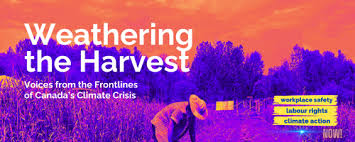‘Weathering the harvest’ campaign seeks to protect the health of farmers, farmworkers from climate change
Climate change is claiming lives and making people sick. Not everyone is affected equally by the extreme heat, bad air days, extended droughts, raging wildfires, and deadly storms. Those who work outside and grow our food are among those risking their lives and health in a time of climate change. Canada’s voice for the family farmer says it is time to institute a number of reforms to protect farmers and farmworkers.
The National Farmers Union (NFU) wants expanded workplace safety regulations, strengthened labour and immigration rights, and more comprehensive climate action to address the escalating impacts of the climate crisis on agriculture. They argue these reforms are urgently needed to protect those who grow our food from death and injuries related to climate change.
Of interest to health and labour advocates are the calls to enhance occupational health and safety legislation and employment standards to adequately protect outdoor workers from the health impacts of climate change.
Did you know that no province has occupational health and safety regulations related to poor outdoor air quality or wildfire smoke? And that only a handful of provinces, British Columbia, Saskatchewan, Manitoba, Québec and Newfoundland and Labrador, have regulations targeting the hazards of heat stress?
According to NFU, we don’t have to look too far for better regulations. For example, the state of Oregon has wildfire smoke regulations that are mandatory and specific. For NFU, the regulations need to also be inclusive of farmworkers, including in languages the workers can understand, and effective in terms of protecting the lives of outdoor workers.
The NFU also notes that farmworkers are often excluded from basic employment standard protections, such as minimum wage, mandatory rest periods, or the right to unionize. The Migrant Workers in the Maritimes research team pointed out the disparities in a recent study on migrant farmworkers in Nova Scotia. According to NFU, “Migrant farmworkers are especially vulnerable to extreme heat events—due to both the nature of their work and, for many, their precarious employment status. Without the security of permanent resident status, many fear deportation and retaliation if they speak out against unsafe conditions.”
To protect farmworkers facing extreme heat, NFU says farms must have adequate access to shade and rest areas, indoor cooling stations, heat stress related breaks, access to cold, potable drinking water at no cost to workers, paid heat stress training, accessible bathrooms and wash stations to rinse sweat-prohibiting pesticides, and a buddy system.
NFU also wants employer-provided farmworker housing to be required to have livable temperatures, with active cooling systems and a maximum temperature requirement of 26 °C. They want proactive inspections and enforcement, and anti-reprisal mechanisms and whistleblower protections. They want farmworkers to be included in disaster planning.
The Canadian Health Coalition has signed an open letter supporting the demands outlined above and are encouraging other health and labour advocates to do the same.
The NFU has been around since 1969, advocating for the family farmer and for healthier relationships with food, the land and people who grow our food, including migrant workers.




